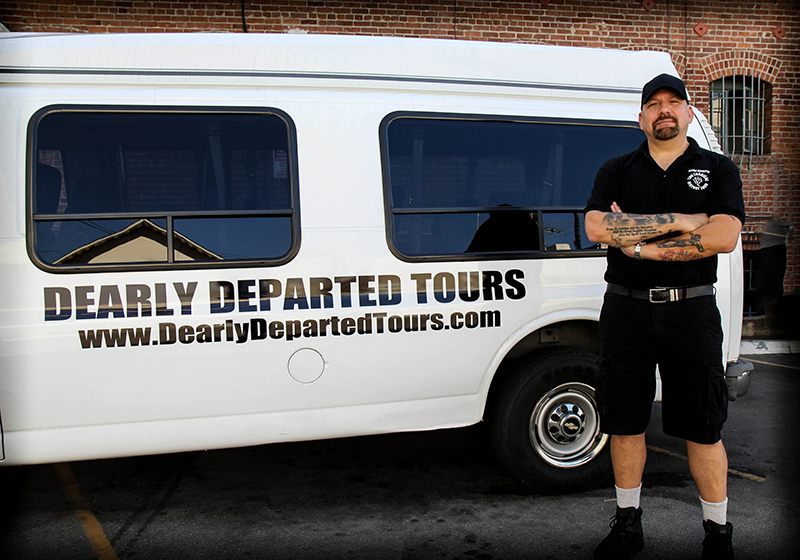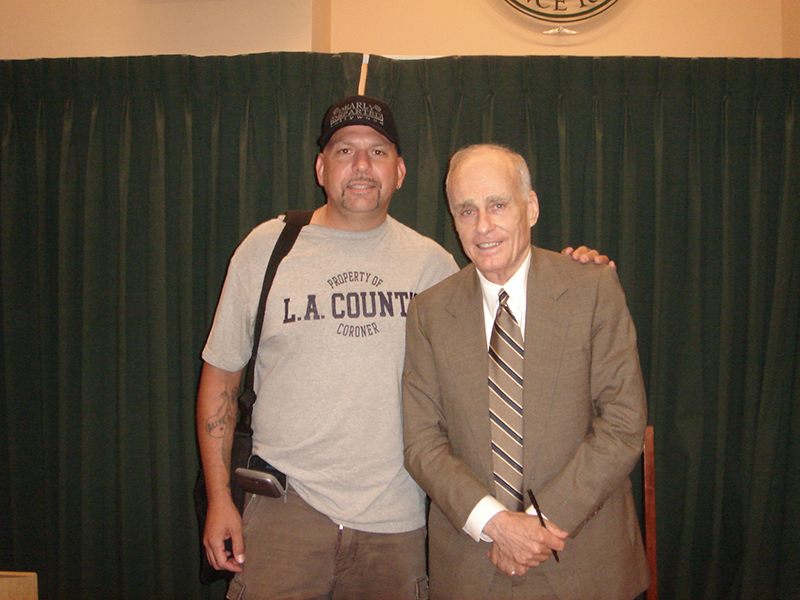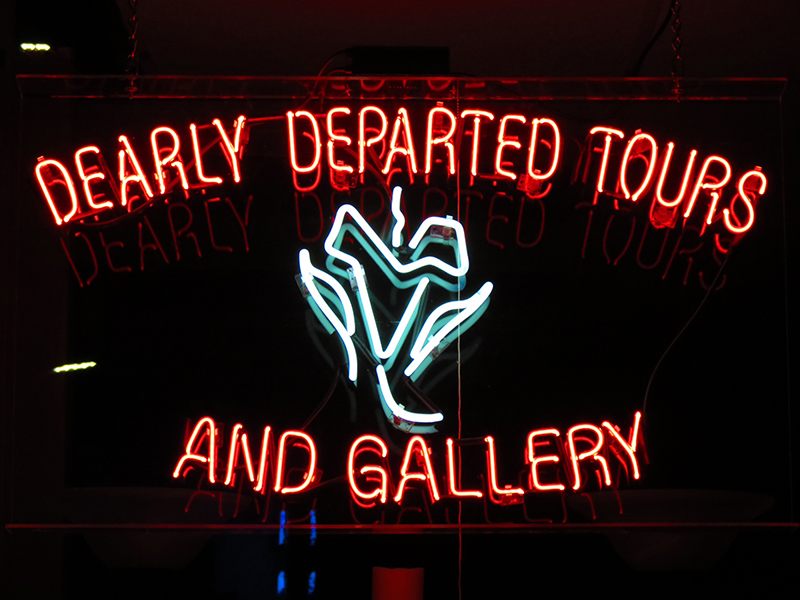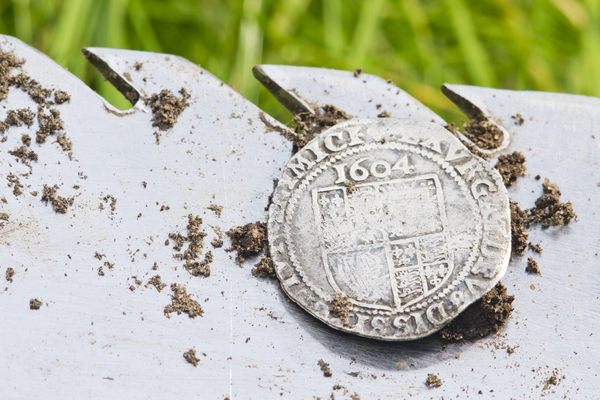The True Crime Tourists Who Visit Sites from ‘Serial’, ‘Making a Murderer’ and More

Scott Michaels by his tour vehicle. (Photo: Erica Lancaster)
A Best Buy in Maryland may not seem like a tourism hotspot, but to fans of the juggernaut true crime podcast Serial, it’s the Taj Mahal.
In the show, which chronicles the mysterious circumstances surrounding the killing of teenager Hae Min Lee and the conviction of another teen, Adnan Syed, for her murder, the Best Buy parking lot in Baltimore looms large. It’s the place where one witness claims he saw Lee’s body in the trunk of Syed’s car and where an incriminating phone call was allegedly placed from a pay phone whose very existence is in question.
Following the astronomical success of Serial (which surpassed 40 million downloads on iTunes), a Best Buy spokesperson told the Huffington Post that so many fans had turned up that the store manager began listening to the show. Other locations central to the podcast have also attracted listeners, including a library in Woodlawn, Maryland, and Leakin Park in Baltimore, where Lee’s body was found. A Google map of Serial locations has clocked over 400,000 views, fans have posted videos tours to YouTube and documented their sightseeing trips on blogs. “I realize that Adnan Syed, Jay Wilds, and Hae Min Lee are real people,” wrote one fan about his Serial pilgrimage, “But since I consider Serial [sic] to be a piece of great literature, I think it’s okay to want to respectfully explore some of the sites mentioned.”
Serial was the starting shot that launched a national obsession with true crime narratives— HBO’s documentary miniseries The Jinx, which follows the exploits of real estate heir and accused murderer Robert Durst, and the Netflix series Making a Murderer, which documents the trials of a Steven Avery, a wrongfully imprisoned man who was freed and then subsequently convicted of murder, both became cultural phenomenons.
Set in rural Manitowoc County, Wisconsin, the Making a Murderer sites are no more obvious tourism magnets than those in Serial, but have still drawn looky-loos. Avery’s brother, Chuck, told the New York Post that “25 to 40” vehicles had cruised up the driveway of the family’s auto salvage yard, which was pinpointed by police as the site of a brutal rape and murder. Jason Ring, president of the Manitowoc Area Visitor & Convention Bureau told the Post that he doubted such visits would flourish as the topic was “too morbid for our kind of crowd.”

Dearly Departed tours focus on the “dark side of Hollywood”. (Photo: jason#12/flickr)
But, despite Ring’s doubts, morbid-ness is probably a plus, not a detractor. Ad-hoc true crime tourism may be having a moment thanks to recent hits, but the pull of murder and mayhem has been fueling formal tourism ventures for decades.
The home where Lizzie Borden may or may not have axed her parents to death now operates as a bed’n’breakfast. For 20 years you could attend a re-enactment of the trial of the Lindbergh baby’s murderer in the courthouse where it happened. There are architectural tours of Chicago that ferry sightseers to spots made famous by journalist Erik Larson’s book, Devil in the White City, about a prolific 19th century serial killer. There is a Jeffery Dahmer tour in Milwaukee, a mob tour in Las Vegas, and a “crooks” tour of San Francisco. True crime tours exist in just about every urban center and beyond.
Scott Michael knows all about the appeal of true crime. His Los Angeles-based tour company, Dearly Departed Tours, has been ushering crowds through the city’s underbelly for 11 years, offering circuits devoted to celebrity deaths, ghosts and horror films. About seven years ago he launched a tour devoted entirely to Charles Manson, the murderous wannabe musician who orchestrated the killing of seven people in late 1960s Los Angeles, including movie star Sharon Tate. For $69, the curious can embark on a 45-mile trip that features audio recordings of key players in the Manson story. The tour draws a steady crowd from all over the world.

Michaels and Vincent Bugliosi, the prosecutor of the Tate/Labianca case and co-author of Helter Skelter. (Photo: Scott Michaels)
In the realm of true crime appeal, the Manson killings are a jackpot.
“It’s such a bizarre story, with real stars in it,” says Michaels. “It’s just over the top. And if you didn’t know it was fact, you’d swear it was something somebody made up.”
And from a practical standpoint, the Manson murders are tailor made for sightseeing. Like real estate, perhaps the most important factor in true crime tourism is location, location, location. Los Angeles offers no shortage of Manson hubs, from scenes of last meals to murder sites, that can be seen within the tour’s three and a half hours.
Exposure and longevity are also key factors, says Michaels. The Manson case nabbed headlines for years, with no small amount of help from Manson and his followers who artfully played to the media. The widely televised trial of O.J. Simpson is another prime example. Michaels is considering putting together a Simpson-centric tour to capitalize on renewed interest sparked by the 10-hour FX dramatization airing in February.
Such attractions have their detractors, of course. In 2012, a planned “Green River Killer Tour” in South King County, Washington that would have taken guests to sites associated with the serial killings of Gary Ridgway, sparked such outrage that the organizer cancelled it.

A sign at Dearly Departed Tours Gallery. (Photo: Scott Michaels)
Michaels has had his share of criticism over the years and says he has learned to brush it off.
“People have been going to the sixth floor of Dealey Plaza for decades,” he says. “Where is the line? The president was shot there, killed. Right from that window.”
Michaels hasn’t dipped into Making a Murderer or Serial yet, but he says he understands why a spot like the Avery Salvage Yard would draw visitors.
“Where somebody’s life ended is just interesting,” he says. “It makes that junkyard a hell of a lot more interesting. My throwaway line is always ‘You can go to a hundred—say 15—houses where Frank Sinatra lived, big deal. But the one he died in—that’s history.’”
Michaels does plan to study up on the Durst case. The businessman will be extradited to Los Angeles where he is charged with the murder of Susan Berman who was shot in her Benedict Canyon home—not far from where the Tate murders happened. If all goes well, criminally-minded tourists might get a new item to put on their bucket list.









Follow us on Twitter to get the latest on the world's hidden wonders.
Like us on Facebook to get the latest on the world's hidden wonders.
Follow us on Twitter Like us on Facebook